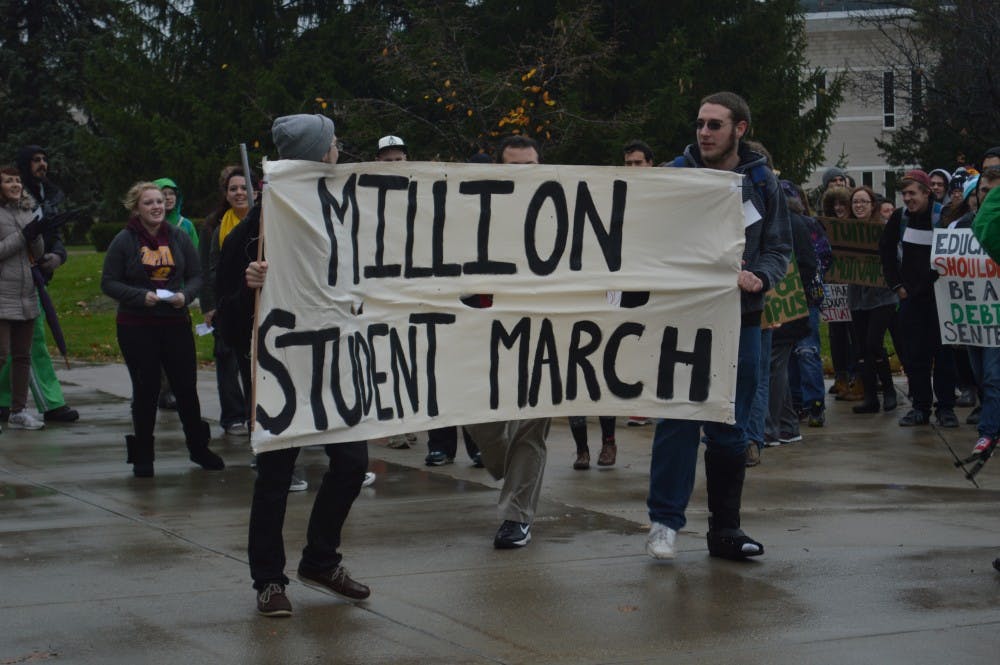Million Student March protestors deliver list of demands to university
When Portia Brown graduated from high school, her father told her he could not help her financially because he didn’t go to college. He also advised her not to take out any student loans.
The Saginaw junior is now sitting on $22,000 of student debt.
She tried to take her father's advice. Her first two years of college were spent living at home while working two jobs to pay for her two classes before her grade point average was high enough to transfer to Central Michigan University on a scholarship.
She works more than 30 hours a week in addition to attending classes and is still taking out student loans.
“I’m not mad because I’m 23, still in school and can’t finish because I have to work. I’m mad because my story is all too common,” Brown said. “I’m mad because I have nieces and nephews who have to go to college in about ten years and it looks like they might have to go through the same thing I do unless they get a full ride college. This ends with our generation.”
The Million Student March, a decentralized call-to-action involving students and faculty, began at 1 p.m. between the Bush Theater and the Moore Hall courtyard today, which is the annual National Day of Student Action.
Director of Public Relations and Internal Communications Steve Smith said that it is good to see students with a renewed interest in politics and the current issues affecting them
"The funding system undoubtedly puts a strain on parents and students. That's an issue happening across the country," he said. "CMU continues to advocate for increased funding for higher education. That's something they've been doing for years and it's certainly something that the president and vice presidents in Lansing continue to advocate on a continuing basis."
More than 90 people marched through campus with signs and chants, ignoring the wind and rain as students could be seen peeking through classroom and dorm windows to see what the chants of “No more cuts, no more fees, give students what they need" were part of. The march ended at Warriner Hall with a speak-out.
“It doesn’t just affect CMU. It affects everyone across America. The $15 an hour pay wage is the most important to me because it’s not about advocating a minimum wage, it’s a living wage,” said Alma visitor Quenton Alexander. "You can’t live off $8 an hour for 30 hours a week. You have people working three or four jobs just to scrape by with two kids. The people who say it’s unreasonable have money. They’re not the people struggling to live.”
More than 110 actions took place in 90 cities across the country today, making students' national demands hard to ignore: tuition-free higher education, the cancellation of student debt and a $15 an hour minimum wage for all college campus employees. Local demands included inducting a mandatory class focused on consent for sex to all freshman, a committee formed of students and faculty to explore CMU’s investment habits, healthcare for all graduate students and for a polling place to be installed on campus. A letter listing these demands was crafted and sent to President George Ross.
Chicago freshman Andria Dumas attended the event because after her mother took out student loans for her own college education, it made it nearly impossible for Dumas to get loans of her own.
“She had to take out a lot of student loans and so taking out loans makes it harder for the child to take out plus loans. I basically cannot take out any more loans because my mom's loans are defaulted. It makes it hard,” Dumas said.
After watching the Iraq war being protested and soldiers were still sent to war and seeing bankers still control Wall Street after the Occupy Wall Street protests, Alma sociology professor John Artl said he began to lose hope that change was possible.
However, at the speak-out section of the MSM, he said he felt excited and hopeful for the first time in a long time.
“I’ve been in college almost this entire time. I’ve been paying through work and loans. I’ve been studying social inequality, and yet we are so used to this broken system that when I focus on educational inequality, I almost exclusively looked at inequality in terms of public school elementary schools and high schools,” Artl said. “It didn’t even occur to me that college could be free and should be free until about five months ago. In the space of five months, I went from realizing it, to teaching it to realizing it’s actually possible."
Organizers held weekly general meetings for the past few weeks to reach out to as many student and faculty groups on campus as possible and to craft their local demands.
MSM was nationally organized by existing activist groups, as well as organizations formed specifically for today’s event. The grassroots effort has reached a national level by a committee responsible for administration and communications.
“We wanted a space where all students felt comfortable expressing their concerns with CMUs socially irresponsibly administration,” said Armada senior Vincent Roncelli. “This event would not be able to happen without the multiple organizers who spent hours emailing all the professors on campus, reaching out to student groups, and handing out fliers all over campus.”
MSM was endorsed by more than ten organizations and coalitions, including Socialist Alternative, Green Party Presidential candidate Jill Stein and the United States Student Association.




